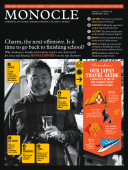
Issue 50
Issue 50 indexes the businesses, brands and nations that have the charm factor. Also, don’t miss our Japan Travel Guide and reports on Ghana’s oil wealth and Tsutaya – which could be one of the best media stores in the world.
In This Issue
Oops! No content was found.
Looks like we no longer have content for the page you're on. Perhaps try a search?
Return Home

